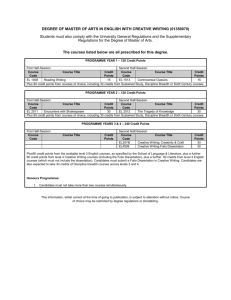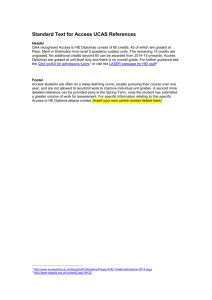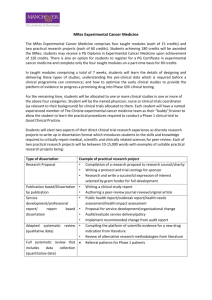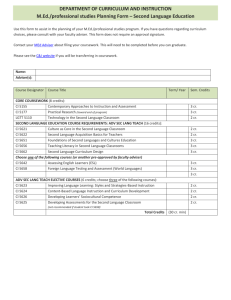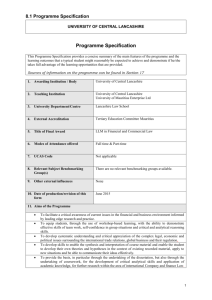Programme Specification and Curriculum Map for MA Management
advertisement
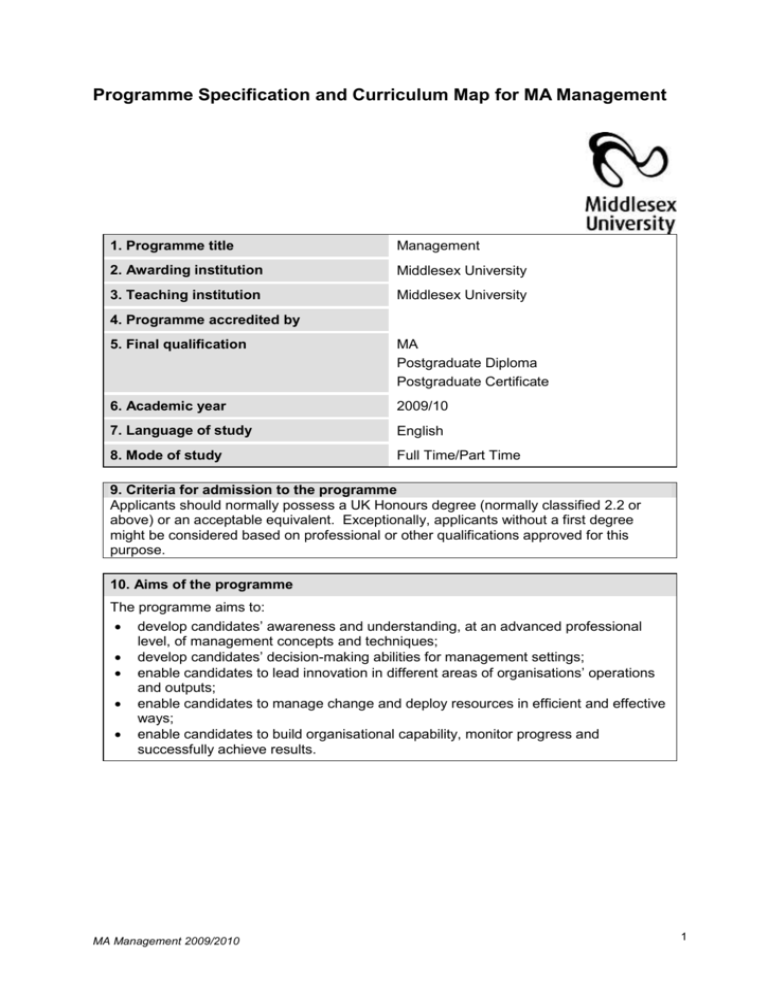
Programme Specification and Curriculum Map for MA Management 1. Programme title Management 2. Awarding institution Middlesex University 3. Teaching institution Middlesex University 4. Programme accredited by 5. Final qualification MA Postgraduate Diploma Postgraduate Certificate 6. Academic year 2009/10 7. Language of study English 8. Mode of study Full Time/Part Time 9. Criteria for admission to the programme Applicants should normally possess a UK Honours degree (normally classified 2.2 or above) or an acceptable equivalent. Exceptionally, applicants without a first degree might be considered based on professional or other qualifications approved for this purpose. 10. Aims of the programme The programme aims to: develop candidates’ awareness and understanding, at an advanced professional level, of management concepts and techniques; develop candidates’ decision-making abilities for management settings; enable candidates to lead innovation in different areas of organisations’ operations and outputs; enable candidates to manage change and deploy resources in efficient and effective ways; enable candidates to build organisational capability, monitor progress and successfully achieve results. MA Management 2009/2010 1 11. Programme outcomes A. Knowledge and understanding On successful completion of this programme, students will be able to demonstrate knowledge and understanding at an appropriate level of: 1. core concepts and theories of management practice in a variety of organisational settings (e.g. manufacturing and service organisations); 2. the essential content of managerial work and the application to that content of insights from specialist management disciplines; 3. the theory and practice of advanced decision-making techniques in management contexts; 4. emerging issues and developments in contemporary management practice; 5. methods and techniques deployed in management research and scholarship. B. Cognitive (thinking) skills On completion of this programme the successful student will be able to: 1. demonstrate advanced levels of critical and reflective thinking applied to management and related topics; 2. critically evaluate aspects of professional managerial work in relation to management concepts and theory; 3. synthesise information from multiple sources and provide argued support for interpretations and evaluations made on the basis of such information; 4. apply suitable conceptual and analytical frameworks to inform effective management practice. MA Management 2009/2010 Teaching/learning methods Students gain knowledge and understanding in the specified areas through a combination of lectures, directed reading, guided independent study, including extensive use of online resources, case studies, guest/visiting speakers, group work, coursework, critical reflection, facilitated discussion, workshops and the dissertation Assessment Method Students’ knowledge and understanding is assessed by an interlocking combination of: individual and group coursework, seen and unseen examination, and the dissertation. Teaching/learning methods Students learn the stated cognitive skills through methods outlined in A above; in particular, analysis, synthesis and evaluation are developed in seminar discussion and debate, as well as through independent study, including use of online resources. Practical guidance is given on all course-related tasks, and feedback is provided on all assessed coursework Assessment Method Students’ cognitive skills are assessed on the basis of group and individual coursework, as well as seen and unseen examination, and the dissertation 2 C. Practical skills On completion of the programme the successful student will be able to: 1. demonstrate their development of advanced skills in management practice; 2. deploy a range of relevant communication techniques in a professional manner, including written and/or oral presentations; 3. demonstrate their capability for selfdirected and self-managed learning dealing with professionally-based tasks and problems; apply a variety of specialised decisionmaking and/ or problem-solving techniques used in management contexts; 4. demonstrate research skills appropriate to postgraduate-level study and presentation. Teaching/learning methods Students strengthen their existing, practical skills through workshops especially in MGT4111 and STX4113. Additionally, practical skills are reinforced and extended through the following: seminar presentations and discussion, individual and group coursework, independent study and specialised research-method workshops. Assessment Method Students’ practical skills are assessed by: group and individual coursework, seen and unseen examination, and the dissertation 12. Programme structure 12. 1 Overall structure of the programme Compulsory Modules MGT4111 – Management Concepts: Theory & Practice (30 credits) STX4113 – Quantitative Analysis for Managers (30 credits) MGT4131 – MA Dissertation (60 credits) Option modules Choose any combination of 60 credits (15 credits modules must be taken in the combinations shown) MGT4119 – Managing Services (30 credits) MGT4143 – Knowledge Management (30 credits) MGT4115 – Managing Innovation (15 credits) MGT4117 – Managing Change (15 credits) MA Management 2009/2010 3 12.2 Levels and modules COMPULSORY Students must take ALL of the following: MGT4111 MGT4131 STX4113 OPTIONAL PROGRESSION REQUIREMENTS Students must take at least 60 credits from the following: MGT4115 AND MGT4117 MGT4119 MGT4143 12.3 Non-compensatable modules Module level Module code N/A 13. Curriculum map See Curriculum Map attached. 14. Information about assessment regulations University and School Assessment Regulations apply to this programme. 15. Placement opportunities, requirements and support N/A 16. Future careers The programme develops students’ advanced-level skills, knowledge and capabilities in management, preparing them, when coupled with the subject areas of their first degrees or earlier professional experience and their interests and aptitudes, for managerial positions in a variety of public and private sector organisations. As a result of the enhancement of students’ independent problem-solving and decision-making abilities during the programme, graduates are also better equipped for entrepreneurial activity. For students who have taken a career break in order to pursue this programme of study, these programmes augment in-company opportunities for promotion and advancement. 17. Particular support for learning Induction programme Full Programme and Module Handbooks (also available online) Module information and learning/support material on online learning resource (Oasis) Library and learning centre resources, with extensive online facilities Postgraduate room in Sheppard library In-module and on-programme guest lectures, plus ‘Distinguished Lecture Series’ of company CEOs and chairmen Designated weekly ‘office hours’ for drop-by guidance plus other one-to-one meetings at appropriate points with teaching staff MA Management 2009/2010 4 18. JACS code (or other relevant coding system) N200 19. Relevant QAA subject benchmark group(s) Masters Awards in Business and Management 20. Reference points QAA Masters Awards in Business & Management QAA Qualifications Framework AMBA Criteria for Pre-experience Masters in General Management The Learning Framework: Programme design Guidance (2006) University Regulations Please note programme specifications provide a concise summary of the main features of the programme and the learning outcomes that a typical student might reasonably be expected to achieve if s/he takes full advantage of the learning opportunities that are provided. More detailed information about the programme can be found in the student programme handbook and the University Regulations. MA Management 2009/2010 5 Curriculum map for MA/PG Cert/PG Dip Management This section shows the highest level at which programme outcomes are to be achieved by all graduates, and maps programme learning outcomes against the modules in which they are assessed. Module Title Module Code Management Concepts: Theory & Practice MGT4111 Managing Innovation & Creativity MGT4115 Managing Change MGT4117 Managing Services MGT4119 MA Dissertation MGT4131 Knowledge Management MGT4143 Quantitative Analysis for Managers STX4113 MA Management 2009/2010 Programme outcomes A1 A2 A3 A4 A5 B1 B2 B3 B4 C1 C2 C3 C4 C5 6 Programme learning outcomes Knowledge and understanding Practical skills A1 Core concepts and theories of management practice in a variety of organisational settings (e.g. manufacturing and service organisations) C1 A2 The essential content of managerial work and the application to that content of insights from specialist management disciplines C2 A3 The theory and practice of high-level decision-making techniques in management contexts` C3 A4 Emerging issues and developments in contemporary management practice C4 A5 Methods and techniques deployed in management research and scholarship Demonstrate their development of advanced skills in management practice Deploy a range of relevant communication techniques in a professional manner, including written and/or oral presentations Demonstrate their capability for self-directed and selfmanaged learning dealing with professionally-based tasks and problems Apply a variety of specialised decision-making and/ or problem-solving techniques used in management contexts Cognitive skills Demonstrate advanced levels of critical and reflective B1 thinking applied to management and related topics. Critically evaluate aspects of professional managerial B2 work in relation to management concepts and theory. B3 Synthesise information from multiple sources and provide argued support for interpretations and evaluations made on the basis of such information. B4 apply suitable conceptual and analytical frameworks to inform effective management practice MA Management 2009/2010 7
